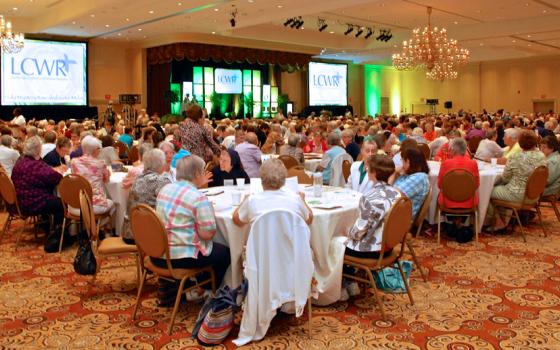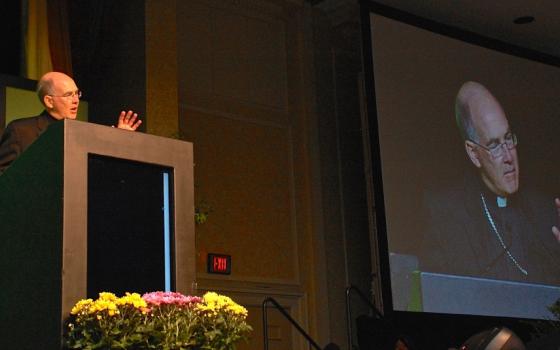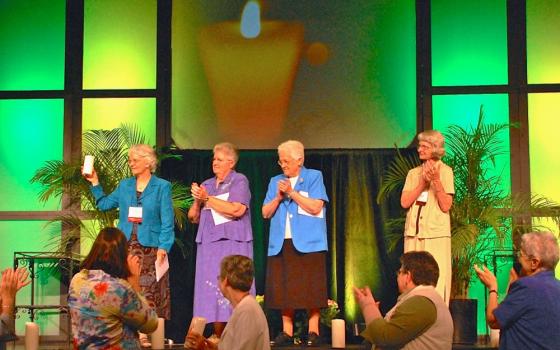Catholic women religious and observers reacted with notable – but muted – relief to Thursday’s news that Vatican oversight of their largest leadership group had ended two years earlier than expected.
The Vatican’s Congregation for the Doctrine of the Faith (CDF) has accepted a final report of the doctrinal assessment of the Leadership Conference of Women Religious (LCWR), officials said, ending the controversial investigation of the group that represents 80 percent of the roughly 50,000 women religious in the United States.
The Vatican congregation asked its own officials and LCWR not to speak to the media on the topic for 30 days, leaving much of the response to outside observers.
Former LCWR president Benedictine Sr. Joan Chittister was one of the few who would speak on the record. She called the agreement very civil.
“The document on the LCWR seems to me to be pretty even-handed. It's not attacking anybody. It's not contentious, and it's civil,” said Chittister, who is a best-selling author and well-known international lecturer on topics of justice, peace, human rights, women's issues and contemporary spirituality in the church and in society. (She is also a contributor to National Catholic Reporter and GSR.)
“It reads to me like women who have been in a long conversation of equals. I'm actually quite proud of the strength that they brought to this issue, and the integrity I think that they have maintained in the conversation.”
Most importantly, Chittister said, LCWR has not lost its ability to operate freely.
“In this document, I don't see any major structural changes,” she said. “At least there's nothing particular here, and that's good news. It's still an organization of women religious, instead of an organization of bishop overseers.”
The CDF had demanded that its appointed bishop approve the speakers at LCWR events; LCWR officials never said outright whether or not they would comply, but did say they would “protect the integrity of the organization.” The report says there is a “revised process” for choosing the recipient of the group’s annual Outstanding Leadership Award but does not say what that process is. Some recipients in the past have been controversial and were a point of contention for Vatican officials.
This year’s LCWR annual assembly will be feature keynote addresses by St. Joseph Sr. Janet Mock, former executive director of LCWR, and Fr. Stephen Bevans, SVD, professor of mission and culture at Catholic Theological Union. The recipient of the 2015 Outstanding Leadership Award has not yet been announced.
Chittister said one of the issues at stake in the doctrinal assessment was the ability of women religious leadership to think freely, to question and pursue ideas and various sides – because the foundation of good decisions is to think a subject through from every angle.
“So, as long as this document does not mean that thinking will be controlled or that answers from the 19th century will be the only answers that this organization can come to, and that only an approved list of speakers can help us explore all the dimensions of any topic – well, then I'm very happy that it came out with such moderation,” Chittister said. “I would simply point out that, in the future, women religious are going to have to be prepared to, again, be early and be first on the major issues that are facing both the country and human beings, because their leadership is essential. Their leadership and thought development is essential to the future of the church as well as the future of religious life.”
Social Service Sr. Simone Campbell, executive director of NETWORK, a national Catholic social justice lobby, said she can’t imagine a better outcome.
“It was such a relief to hear they were ending this thing,” Campbell said. “Dialogue really was key in this – the quality dialogue between LCWR and [Vatican appointee] Archbishop Peter Sartain to understand both the mission and the lived experience in a different way.”
Campbell said it was important that the Vatican recognized women religious’ importance to the body of Christ.
“They acknowledged LCWR’s [publications are] not just for sisters, but that they also feed hungry people,” she said, “that in addition to their mission of service to sisters, there’s a bigger service they perform. To have the Vatican acknowledge that was an interesting assessment of how hungry our people are, and I think it’s a reflection of the current leadership and our Pope and his engagement of encounter.”
Ken Briggs, author of Double Crossed: Uncovering the Catholic Church's Betrayal of American Nuns, notes that the documents released give little insight to what really happened, “because all the details, nuances and transcripts are held in traditional secret.”
And in some ways, what has been revealed is not exactly a win for women religious, he said.
“The Vatican has in effect said the nuns have implemented the changes which the bishops demanded, therefore the terms of their censure have been satisfied, oversight can be ended and all is well,” Briggs said. “The nuns say they are pleased. Rome has made its point, the nuns have prayed, talked and apparently agreed with them, and everyone seems to believe that the censure produced some value.”
That, he said, reinforces the traditional roles, where “the Vatican hierarchy spells out teachings and requirements by virtue of rights accorded them by ordination and the nuns abide by their vow to obey authority. Under this mandate, collaboration is non-essential.”
That church philosophy is very different than society’s, Briggs said.
“From a North American point of view, to say nothing of a feminist perspective, this is a display of submission by the nuns to unfair accusations without any open, due process, but this criticism comes from another culture,” he said. “Meanwhile, the nuns have honored the authority structure of the alternative culture to which they committed themselves and have exercised their right not to challenge it.”
Fr. Francis X. Clooney, a Jesuit priest and professor of divinity and comparative theology at Harvard Divinity School, where he is also director of the Center for the Study of World Religions, said Pope Francis definitely influenced the agreement.
“The change is due to the pope's clear signs that his priorities are different – not that he does not care about doctrine or thinking with the church, but that, like the LCWR, he wants to approach those issues in light of the urgent issues of our times, with a productive communal and justice-oriented approach, not doctrine for its own sake,” Clooney said.
“I would think, given the maturity and seriousness of the LCWR leadership, and this seemingly new moment in their relationship with the CDF, this could model how the Vatican and its congregations relates not only to the sisters, but also to other groups in the church, groups that likewise have concerns about the faith and practice of the faith, remain loyal, do the work of Christ, and therefore push the boundaries. This could be a moment to the benefit of all of us.”
Betty Thompson, of the lay group Solidarity With Sisters, said it appears that some of the report was a formality.
“Some of this language, I wonder if it was just needed to honor the process,” she said.
That’s not to say the process wasn’t taken seriously: “I do believe they've had serious conversations around all this. I take seriously what they say in their statements that what both sides discovered is how much they have in common.”
Thompson also praised Seattle Archbishop Sartain’s work.
“As much as I admire those women [of LCWR], there's no way they can bring about this extraordinary, peaceful resolution without being met by someone of goodness and openness and readiness to dialogue,” she said. “And so I just have confidence that that was there in Archbishop Sartain, in his conduct. It's not possible without it, right? And the only way to that that I can imagine is this dialogue that I believe has happened very quietly between, primarily Archbishop Sartain and LCWR.”
Advocacy group Nun Justice Project issued a statement saying it was fitting that in the Year of Consecrated Life, church officials finally recognized the work and leadership of sisters. But the group also wants more.
“The Nun Justice Project believes that an apology should also have been given to the sisters, but the end of the investigation is a major step in itself,” the statement said. “Since no previous Pope ever met with LCWR leadership, it is hopeful that Pope Francis met personally with them today. May this meeting inaugurate new era of positive communication between the Vatican and women leaders in the Church.”
Church reform group Call To Action said the announcement was “enthusiastically welcomed.”
“The bold and faithful witness of women religious, their leadership, gifts and charisms are pivotal for the life of our church. We give thanks that this painful experience appears to have finally come to an end,” said Call To Action Executive Director Jim FitzGerald. “We continue to stand with the sisters and hope today’s action opens the door for a more equal relationship between women leaders and Vatican officials.”
Deborah Rose-Milavec, executive director of church reform group FutureChurch, which is part of the Nun Justice coalition, said the group is happy to see the “siege” of unwarranted accusations come to an end.
“Without doubt, this pointed attack was grossly unjustified. And yet, in the midst of the CDF's sustained scrutiny and distrust, LCWR forged a path of respectful dialogue that was a model for the entire church and even a help to those who issued the mandate,” Rose-Milavec said. “FutureChurch applauds Pope Francis for meeting with LCWR leaders and expressing his respect and appreciation for their faithful service to the Gospel. And we are profoundly grateful for the many Catholics who rose to the occasion and stood in solidarity with our sisters over the last three years.”
[Dan Stockman is national correspondent for Global Sisters Report. Follow him on Twitter @DanStockman or on Facebook. Dawn Cherie Araujo is staff reporter for Global Sisters Report based in Kansas City, Missouri. Follow her on Twitter @Dawn_Cherie.]




